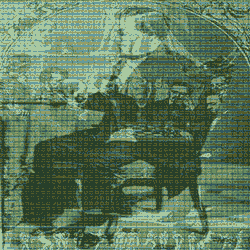Paul Morphy - Pride and Sorrow
by AJ Brown
(New York, NY)
Arguably one of the greatest chess players in the history of the game was Mr. Paul Morphy, a self-taught American chess master who lived from 1837 - 1884. Mr. Morphy, nicknamed "The Pride and Sorrow of Chess" and declared “the Champion of the World” in his day, was first introduced to the game when he watched a match being played between his father and uncle.
He was only nine by the time he had gained notoriety as one of the finest chess players in New Orleans. In his adolescence, he was the victor in several matches against General Winfield Scott, a US Army general, and, at age twelve, he defeated Hungarian master Johann Löwenthal over the course of three games.
Morphy, a student of law at Spring Hill College and Tulane University (formerly the University of Louisiana), was recruited to participate in the First American Chess Congress held in New York City. He traveled to New York and famously won match after match, garnering great national attention and receiving accolades as a fierce chess player.
He traveled to Europe with the intention of playing Howard Staunton, an English master who was ranked the greatest chess player alive in the mid-1800s, leaving numerous rivals and challengers to his ascendancy in his wake. Most opponents refused to accept his challenges unless he played with a handicap.
He played his way across Europe, defeating almost every master on the continent, though he was never able to finalize a match with Staunton. He returned to the United States in the late 1850s and worked his way back to New Orleans. Once in New Orleans, having defeated most every serious opponent in the Western world, Morphy declared his retirement from chess to concentrate on his law career. However, his practice did not enjoy nearly as much success as his chess career had seen, and he spent a good deal of his final years in obscurity, living off family money, and playing chess only for recreation. He died of a stroke in 1884 at age forty-seven.
Morphy’s strategy and style was unique for its day, combining several popular methods which often included sacrificing important pieces for the purpose of ensuring checkmate. Logs of games he participated in still exist, and many of the strategies he employed have become staples in books about chess strategy. His techniques are favored by many conservative players as they are not considered to be quite as 'flashy' as other players of comparable skill.
Legendary chess player Bobby Fischer often cited Morphy as an inspiration and exemplary of refined strategy and skill. He is often referred to as the first modern chess player, and has been compared to other behemoths of chess lore such as José Raúl Capablanca and Adolf Anderssen.
Morphy's life is considered by most students of the game to be a romantic and tragic story of one of the greatest American chess players in history. At a young age his opponents underestimated his strengths and witnessed his rise to power. But his career as a chess master fell short towards the end of his life, reflecting societal norms about game-playing and gambling as a legitimate career.
Further material on Paul Morphy
Click here to read or post comments
Paul Morphy - Genius.
by Facila Alexandru
(Romania)
Undoubtedly, the most striking figure in the history of chess romantic period and at the same time, one of the most representative players of all time was the American Paul Morphy.
Born on June 22, 1837 in New Orleans, to an French Creole mother and a Spanish father with Spanish, Portuguese, and Irish heritage. He learned chess at an early age and at 10 years enjoyed his first remarkable success. His talents manifested themselves not only in chess, but in the sciences, Studying maths and philosophy, Morphy was award an A.M. degree with the highest honors in May 1855.
In 1857, while studying in the same year, Morphy competed in the first U.S. chess championship, defeating in the final redoubtable Louis Paulsen (note that an average game takes about 10 hours, thanks to unlimited thinking time).
Enjoying much success, Morphy crossed the ocean in 1858, with the intention to win and claim glory on the old continent. He hoped to meet with the European No.1 player, Britain's Howard Staunton (Morphy's purpose of remaining in England for 3 months), but through the use of subterfuge (eg, claiming to be completing Shakespearean works, but playing all the while in tournament chess!), Staunton managed to avoid confrontation.
In these circumstances, he went to Paris with two matches against Harrwitz and Lowenthal, both won. At the end of the games he would use the match stakes to organize the next match. He received match stakes against Lowenthal and sent the entire prize to Harrwitz.
He sent the winnings from the Harrwitz match straight on to Adolf Anderssen, the unofficial world champion of 1851 to dispute the title of best chess player in the world. Despite being practically bedridden, and needing to repeatedly take blood with leeches Morphy defeated Anderssen in Paris match with 8-3!
Next, at the Italian Opera in Paris, he checkmated the Duke Karl and Count Isouard (who played in consultation) in 17 moves. Then Morphy engaged a series of blindfold simul exhibitions with 8 boards, Hence the famous witticism linked Morphy's superiority against Caesar: He came, he saw, he conquered!
On April 28, 1859, Morphy returned to New York, where he enjoyed a triumphant reception, being welcomed, the agreements the national anthem over 2,000 people. At the Chess Hall of the University in the city he was handed a splendid chess seal, marked with his monogram, with figures of gold and silver.
In his speech, Colonel Mead described chess as a profession, which irritated Morphy, since accusations of mercantilism wounds from Staunton's side still not been closed. The ceremony turned into a scandal, which ultimately had serious consequences on the American player's psyche.
He left Louisiana during the Civil War when his anti-War views did not find favor with many Louisianians.He spent time in Cuba, then in France.
After peace, Morphy returns to his native country, but not the consuming passion of his life, which was chess. Moreover, he was reluctance, in 1882, to accept a survey done to establish the most important being the city of New Orleans, he rejected completely the activity carried on the 64 squares. Two years later Morphy died, only 47 years old after a stroke suffered in the bathtub.
Behind a whole series of puzzles remains personal interest worthy of psychoanalysts (who have for example commented extensively on the chastity of Morphy), but his legacy is essential to chess, and this is of undeniable value. Even the legendary Bobby Fischer recognized as a great precursor, even, perhaps, as a model mystery!
Supremacy in Chess
by Jason Biocchetti
(Detroit, Michigan)
Paul Morphy was considered as the first person to be honored as the World Chess Champion though it was not officially confirmed. But there is no doubt that it was a great achievement and accomplishment. He was well known for his proficiency in closed openings. He was the first modern chess player we can say! He had expertise in combinative skills and as a great strategist.
His inspiration and dedication towards his task were unmatchable. He was born for it and treated the chess as an art and played it as an artist. He incorporated freshness in each game he played with new energy. Truly we can say that he played a perfect and true chess.
He had never tried to get into the psychology of the opponent. He was rightly nicknamed The Pride and Sorrow of Chess. Even today many chess players confirm him as the greatest chess master in the history of chess. He was a child prodigy, who did not receive any professional training for playing chess in the beginning.
He just observed others playing chess and started developing interest in it. Many times while he was watching his dad and uncle playing chess, the comments and tips given by him astonished them! Even at that young age he had strategy.
Once, when he was eight years old, General Scott visited his city, and wished to have a chess evening with an equal opponent. The people took Morphy as Scott’s opponent and Scott was offended seeing the little boy! After the game started very easily Morphy beat him twice!
Thus his career began. He was invited to take part in First American Chess Congress in 1857. He went to New York and won the competition. He won fourteen, lost one had and three draws! This made him want to test his skill in chess abroad. He then played against many chess masters and some even denied playing with Morphy. He even made blind fold games with eight people at a time and won.
When he declared an open challenge to anyone in the world to play with him, he didn't get any acceptance and declared himself retired. He led a depressed and unrest life in later years and spent his time wandering. He died at a young age of forty seven. He is considered till today as the Supremacy in Chess!









